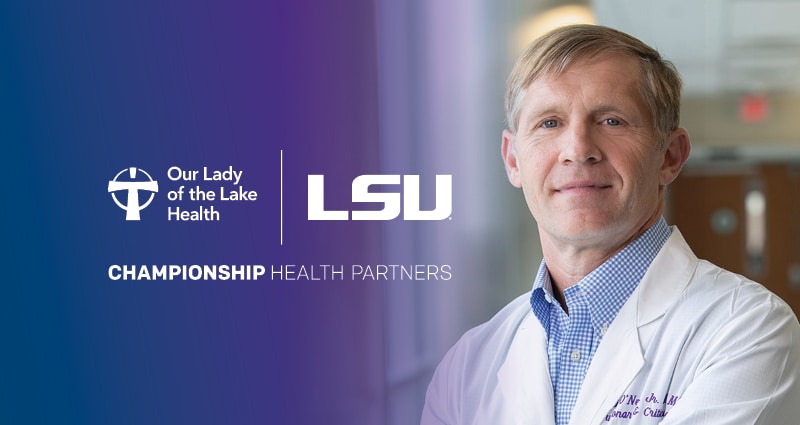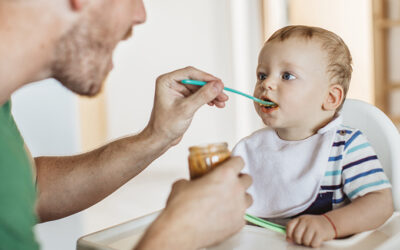How does the physical and mental health of LSU student-athletes evolve when their playing careers are over? And how could that information benefit the health of not only current and former student-athletes but the larger population as well?
Those are the questions being asked by researchers from Our Lady of the Lake Health, LSU, LSU Athletics, LSU Health New Orleans and Pennington Biomedical Research Center through a research project recently funded through the Collaboration in Action program.
The program is part of the larger collaboration between Championship Health Partners Our Lady of the Lake Health and LSU and seeks to advance research in the priority focus areas of heart disease, cancer, accidents and chronic respiratory diseases — the four leading causes of death in Louisiana.
The inaugural round of research funding includes $1.2 million for five collaborative research teams, including a team of seven researchers studying how the competitive lifestyle and known social determinants of health of collegiate athletes affect their cardiometabolic, immune and mental health — both in the near and long term.
What Happens When You Stop Competing?
Led by Neil Johannsen, PhD, Robert and Patricia Hines Endowed Professor in the LSU School of Kinesiology and researcher at Pennington Biomedical, the team also includes Hollis O’Neal, MD, medical director of research at Our Lady of the Lake Health and associate professor of medicine at LSU Health New Orleans.
“Student-athletes’ whole life is hyper-scheduled and is driven by the competitive activity they perform. What happens when they leave that environment?” Dr. O’Neal says. “This study looks at both the physical health and the psychological health of retired athletes.”
The research will initially use questionnaires and medical history to study current student-athletes as well as those at various stages of their post-athletic careers. Researchers could potentially use in-person physical testing to gain further insight into the unique physical and mental transitions that the majority of collegiate athletes face.
“Well under one-tenth of 1 percent of student-athletes will go on to play professional sports,” Dr. O’Neal says. “Most of them go on to become you and me and get a regular job. So, there’s a lot of transition there, including their level of physical activity.”
The findings of this study could benefit more than just elite collegiate athletes. According to Dr. O’Neal, the racial and gender diversity present among student-athletes makes them an ideal group to help study the larger population.
“If we can study elite athletes and figure out what happens to them over their lives, then we might be able to gain some information to help the everyday Joes like me and you understand how we age and what we need to do to maintain our own health,” Dr. O’Neal says.
Just the Beginning
This study is the first research project to come from the recently created Center for Exercise Science and Sports Medicine, a collaboration among Our Lady of the Lake Health, LSU, LSU Athletics, LSU Health New Orleans and Pennington Biomedical. The first center focused on athletic research in Louisiana, the team was granted $250,000 earlier this year through the LSU Provost’s Fund for Innovation in Research.
The goal of this initial study is to determine the efficacy of this type of research, leading the way for more in-depth research in the future.
In addition to Dr. O’Neal and Dr. Johannsen, the research team includes Shelly Mullenix, senior associate athletic director with LSU Athletics; Guillaume Spielmann, PhD, associate professor in the LSU School of Kinesiology and adjunct associate professor at Pennington Biomedical; Tiffany Stewart, professor, clinical psychologist and director of the Behavior Technology Laboratory at Pennington Biomedical; Samuel Stroope, professor in the LSU Department of Sociology; and Robert Zura, MD, professor and chair of orthopedic surgery at LSU Health New Orleans and orthopedic surgeon at Our Lady of the Lake Health.
Together, the group brings a wide range of talents, specialties and passions, which is imperative when studying the complex mental and physical changes that occur in people as they age.
“No one person can be an expert in everything, so you have to be collaborative,” Dr. O’Neal says. “Dr. Johannsen understands the human condition is much more than just the heart and the lungs and the blood. It’s the psychology, it’s the immunology, it’s the society, it’s our social determinants, it’s how we grew up and who our parents were and what our support system was. It’s all of these things that come together. The human condition is much bigger than any one person can understand.”




